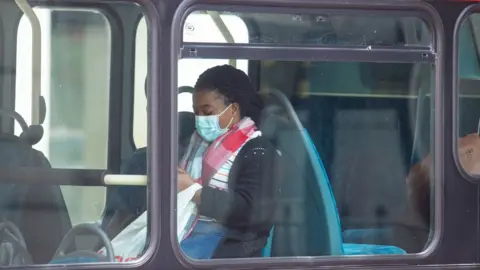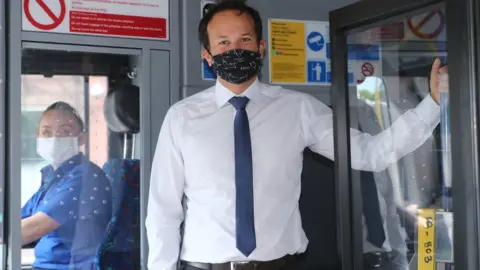Coronavirus: Compulsory face coverings on buses, trains and ferries
 PA Media
PA MediaThe wearing of face coverings on most buses, trains and ferries will be mandatory in Northern Ireland from 10 July.
There are exemptions for those with medical conditions.
It will not apply to children under the age of 13, or on school transport.
Outdoor areas of a ferry where social distancing can be maintained will be exempt from the requirements, Infrastructure Minister Nichola Mallon has said.
The executive has agreed that the cross-departmental group that has been established to consider face coverings will engage with the tour coach and taxi industry to explore extending the requirement to these transport modes.
Medical exemptions
In a statement, Ms Mallon said that as restrictions on movement are eased, the safety of passengers and staff remains her priority.
"The evidence suggests that you can reduce the risk of spreading the virus by wearing a face covering.
"The requirement will apply to passengers and also staff in public areas who are not protected by a screen. However, there will be exemptions for those who are not able to wear a face covering for specific health and medical reasons."
Her statement clarified that a face covering is "a covering of any type which covers a person's nose and mouth - it does not have to be a surgical face mask".
It also acknowledged that face coverings "will not be suitable for all members of the public".
"Advice will be available on nidirect and social media channels. Translink staff will begin preparing commuters for the requirement to wear face coverings.
"It is also important that you do not get a false sense of security about the level of protection a face covering offers. They are not a substitute for social distancing or good hand hygiene."
Ms Mallon has had discussions with unions and the police about the model of enforcement, which it is understood is likely to be similar to measures introduced in Scotland, with spot checks by police and fines for those breaking the rules.
The move was welcomed by the union Unite as a means of reducing the risk to others and giving greater confidence to those travelling.
Davy Thompson, from Unite, said several unions had called for the measure and added that he hoped people would realise the importance of masks.
"Whilst you maybe asymptomatic, you don't know what you're spreading to other people and you don't know what people are going home to in terms of vulnerable parents children or partners," he said.
 Niall Carson/PA
Niall Carson/PAThe mandatory use of face coverings on public transport was introduced in the Republic of Ireland on Monday and has been in place in England and Scotland for a number of weeks.
Meanwhile, in Scotland, First Minister Nicola Sturgeon has announced that the use of face coverings will become mandatory in shops on 9 July as coronavirus restrictions are eased.
Non-essential shops have re-opened in Scotland and bars and restaurants are due to open up again later this month.
The Department of Health reported one further coronavirus-related death in Northern Ireland on Thursday, bringing its total to 552.
It also said that the current estimate of the R-value - or reproduction number - is between 0.3 and 0.8.
